June 14, 2025 | 01:59 GMT +7
June 14, 2025 | 01:59 GMT +7
Hotline: 0913.378.918
June 14, 2025 | 01:59 GMT +7
Hotline: 0913.378.918
According to Deputy Director of Lam Dong Agricultural Extension Center Nguyen Minh Truong, farmers in Lam Dong in general and Da Lat city in particular have a high production level in comparison to the national average.
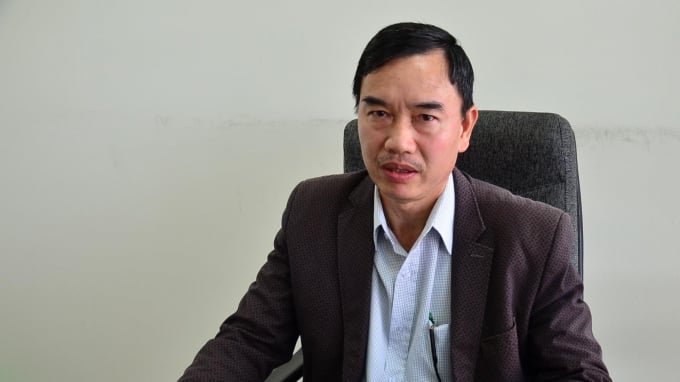
Deputy Director of Lam Dong Agricultural Extension Center Nguyen Minh Truong. Photo: Duong Dinh Tuong.
How can you make a comparison of the production level of farmers in Lam Dong province with neighboring provinces? Did they get to that level through self-motivation or is there another reason?
As many people in the agricultural industry have assessed, farmers of Lam Dong in general and Dalat in particular possess higher production level compared to the national average level.
The first reason comes from the soil conditions. The climate of Lam Dong is very suitable for growing vegetables and flowers of better quality than in other regions, has brand names, and cultivation here has become a traditional profession. Secondly, there are a number of leading enterprises like Dalat Hasfarm that settle here first, bringing in high technologies and new varieties, and from which people can learn. Thirdly, the agricultural sector has made a significant impact especially through hi-tech agricultural development programs.
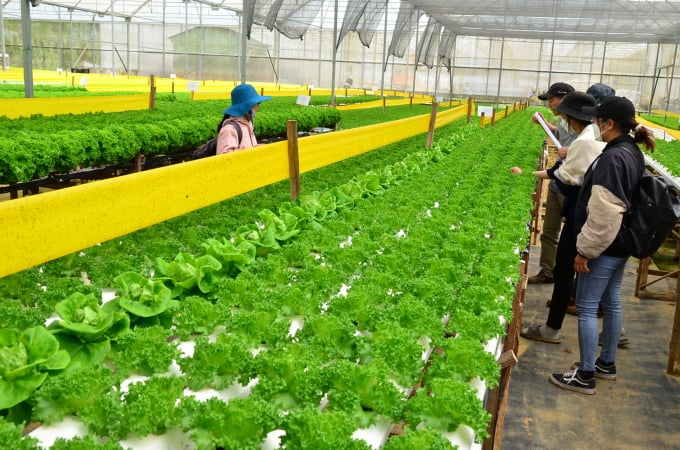
Guests visiting Lang Biang Farm. Photo: Duong Dinh Tuong.
Another very important reason is that farmers of Lam Dong in general and Da Lat in particular are very active, creative, and eager to learn new things. They are always looking for effective new models, and new varieties, especially vegetables and flowers. Some farmers like Mr. Phan in Ward 9 (Da Lat City) go online to order giant pumpkins from the USA to develop agrotourism.
In short, the state only provides initial support in the sense that it builds the first greenhouse models, irrigation systems, transfers new varieties and technology, and promotes policies related to food safety, VietGAP, and organic certification.
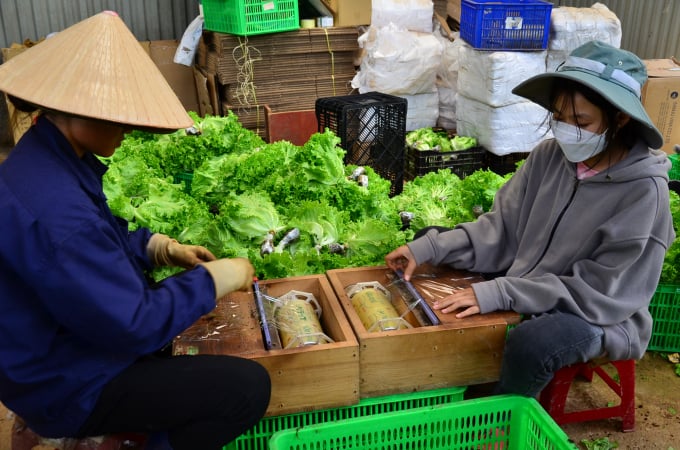
Vegetable packing at Truong Phuc Farm. Photo: Duong Dinh Tuong.
Our hi-tech agriculture program is divided into several phases. The first phase from 2004 to 2010 included planning hi-tech agricultural production areas, creating conditions and mechanisms for attracting investment. At that time, the state provided support to build models, transfer technology and train farmers to increase their productivity and output.
In the second phase from 2011 to 2015 we promoted the application of hi-tech agriculture in both width and depth, increasing the production area and at the same time improving productivity and product quality. The program had applied more science, technology and new advances at this stage. In the past we only had net houses and greenhouses, then later automatic irrigation systems were added, and many other contents were also integrated into the program.
In the third phase from 2015 to the present, the province's policy is to develop hi-tech agriculture on the basis of comprehensive, sustainable and modern agricultural development. Lam Dong plans to move forward in parallel: applying hi-tech agriculture while performing smart agriculture and organic agriculture.
The provincial Agricultural Extension Center is currently tasked with implementing the organic agriculture development scheme by conducting surveys, planning areas eligible for organic production, building models, training personnel, transferring techniques, and developing organic production procedures for key crops and livestock.
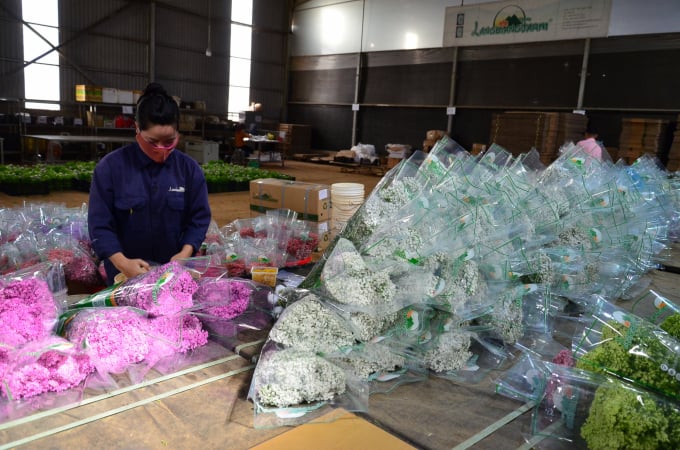
Packing flowers at Lang Biang Farm. Photo: Duong Dinh Tuong.
Lam Dong's hi-tech agricultural application area is currently about 63,000 ha out of a total cultivation area of approximately 315,000 ha. The effect of hi-tech applications in agriculture is clearly visible. Productivity, product quality, selling price, and economic efficiency have shown remarkable improvement.
On average, vegetables applied to hi-tech agriculture can help farmers earn VND 400-800 million/ha/year, flowers from VND 800 million to VND 1.2 billion/ha/year, and moth orchids for export VND 7 - 10 billion/ha/year.
In the 90s of the last century, agricultural extensionists were superior to farmers in terms of technology. They introduced hybrid maize, hybrid rice, hybrid pig, and hybrid cow varieties to help farmers eliminate hunger and reduce poverty. But now, it often feels like agricultural extension officers, especially those who have just graduated, lose out to hi-tech farm owners in terms of both production techniques and product commercialization. What are your thoughts on this matter?
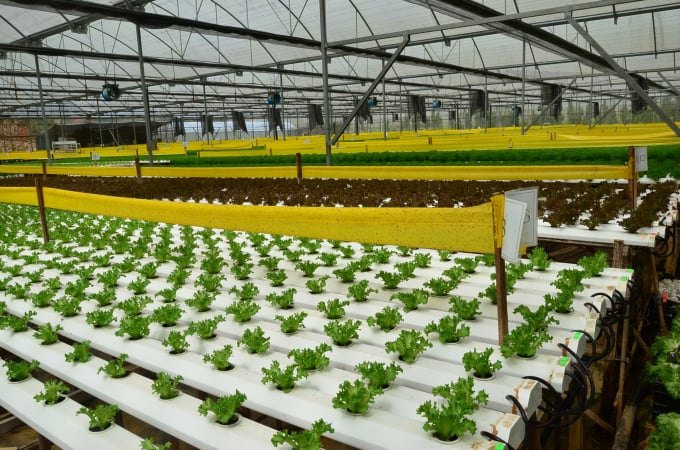
Growing hydroponic vegetables at Lang Biang Farm. Photo: Duong Dinh Tuong.
In the early days when the new agricultural extension system was formed, its main task at that time was to transfer technology to farmers. The level of farmers at that time was not as high as now, especially those in remote areas, so it was very suitable to apply to production the techniques transferred thanks to the agricultural extension system.
But now the level of farmers has been raised, so the agricultural extension system requires more self-studies to meet the new requirements. Agricultural extension must also integrate many contents, production must follow production linkage and take into account the consumption of products.
Currently there are a number of such models that not only transfer technical elements but also solve difficulties and obstacles in the process of linking production and product consumption. In some models, we invest, support groups of households, and produce a certain type of product. This group of households use the same input materials, apply the same production procedure, and ensure the standards of purchasing enterprises then sign contracts with them.
Thank you, sir!
Translated by Samuel Pham

(VAN) In Tien Giang, a high-tech shrimp farm has developed a distinctive energy-saving farming model that has yielded promising results.
![Turning wind and rain into action: [3] 300.000 farmers benefit from agro-climatic bulletins](https://t.ex-cdn.com/nongnghiepmoitruong.vn/608w/files/news/2025/06/12/e5a48259d6a262fc3bb3-nongnghiep-125122.jpg)
(VAN) The agro-climatic bulletin has become a valuable tool for farmers in the Mekong Delta. After more than five years of implementation, the initiative is gradually being expanded nationwide.
![Turning wind and rain into action: [2] Providing forecasts to the people](https://t.ex-cdn.com/nongnghiepmoitruong.vn/608w/files/news/2025/06/12/e5a48259d6a262fc3bb3-nongnghiep-103927.jpg)
(VAN) In addition to improving the quality of hydrometeorological forecasts, putting forecast bulletins into practical use is crucial for production and disaster prevention.

(VAN) Blue carbon is receiving attention for its rapid absorption capacity and vast potential. It represents a promising nature-based solution to respond to climate change.
/2025/06/11/3507-1-161904_583.jpg)
(VAN) Seagrass beds and coral reefs serve as 'cradles' that nurture life in the ocean depths, creating rich aquatic resources in Vietnamese waters.
![Turning wind and rain into action: [1] Forecasting for farmers](https://t.ex-cdn.com/nongnghiepmoitruong.vn/608w/files/news/2025/06/11/e5a48259d6a262fc3bb3-nongnghiep-111919.jpg)
(VAN) Weather is no longer just a matter of fate. Forecasts have now become an essential companion for farmers in every crop season.
/2025/06/10/2501-3-082025_983.jpg)
(VAN) Mr. Le Hoang Minh, Head of Vinamilk's Net Zero project, recently shared insights on the integration of production, energy, and technology in Vinamilk’s green transition journey.